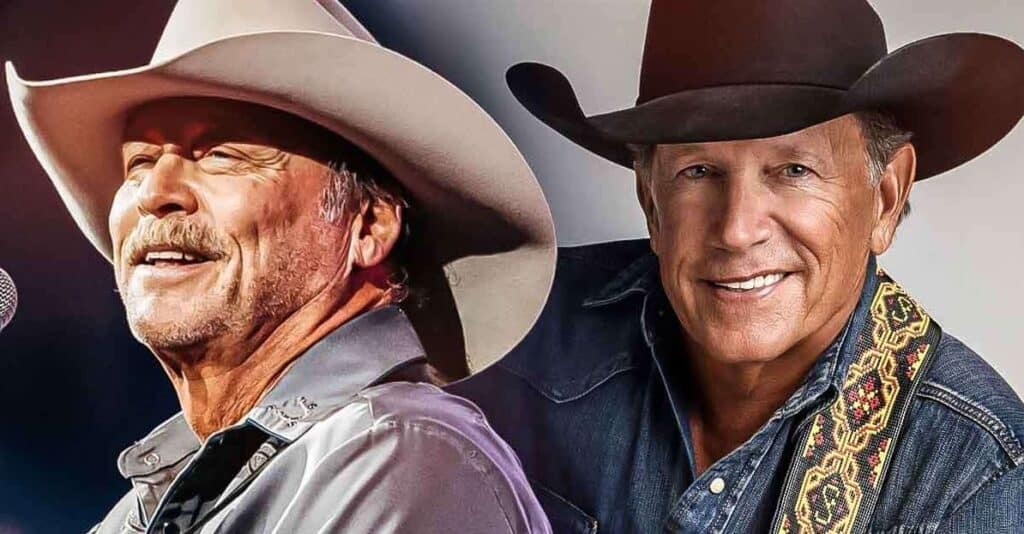In today’s ever-evolving music industry, traditional country music has often found itself at a crossroads. While contemporary trends lean toward pop-infused melodies and commercial appeal, the essence of true country—honest storytelling, heartfelt lyrics, and timeless instrumentation—remains irreplaceable. Few songs embody this struggle better than “Murder on Music Row”, a powerful anthem written by Larry Cordle and Larry Shell, and brought to life by two of country music’s greatest legends, Alan Jackson and George Strait. Their rendition not only honors the roots of country music but also serves as a poignant critique of the industry’s drift from authenticity.
The Story Behind “Murder on Music Row”
“Murder on Music Row” is more than just a song; it is a narrative of loss and a rallying cry for traditional country fans. Penned by acclaimed songwriters Larry Cordle and Larry Shell, the track addresses the gradual decline of authentic country music on Nashville’s famed Music Row. Through its lyrics, it laments how the genre that once celebrated simple truths, acoustic storytelling, and heartfelt emotion has increasingly succumbed to pop influences and formulaic production.
The song paints a vivid picture: the heart and soul of country music are metaphorically “murdered” by commercial pressures. Every verse resonates with listeners who grew up on classic country, evoking nostalgia for an era when Johnny Cash, George Jones, and Merle Haggard dominated the airwaves. It challenges both the industry and fans to reflect on the importance of preserving the genre’s original spirit.
Alan Jackson and George Strait: Champions of Country Tradition
Few artists embody the spirit of traditional country music like Alan Jackson and George Strait. Jackson, often hailed as one of country’s finest storytellers, has consistently fused classic honky-tonk with contemporary sensibilities, creating a bridge between the past and present. George Strait, known as the King of Country, has spent decades honoring the genre’s roots, delivering music that resonates with authenticity, simplicity, and emotional depth.
Their collaboration on “Murder on Music Row” is monumental. Not only does it highlight their shared commitment to true country values, but it also showcases their ability to convey profound emotion through song. Their voices, distinct yet complementary, bring a sense of gravitas to the lyrics, turning the track into a timeless anthem that resonates with both long-time fans and new listeners seeking the essence of country music.
A Lyrical Critique of Modern Country
The lyrics of “Murder on Music Row” are sharp, reflective, and deeply evocative. They describe a genre in peril, where traditional storytelling has been overshadowed by commercial formula. Lines that mourn the “loss of honky-tonk” and the “disappearance of classic sounds” strike a chord with listeners who value genuine musical artistry over mass-market appeal.
This lyrical honesty is part of what makes the song so powerful. It does not shy away from criticism; rather, it boldly exposes the tension between commercial success and artistic integrity. In doing so, it gives voice to fans and artists alike who long for the return of authentic country sounds on radio airwaves and streaming platforms.
Impact on the Country Music Industry
Since its release, “Murder on Music Row” has become a symbol of resistance against the commercialization of country music. Its influence extends beyond mere chart performance; it has sparked conversations about the genre’s direction, inspired younger artists to embrace traditional sounds, and reaffirmed the importance of lyrical storytelling.
By collaborating on this song, Alan Jackson and George Strait reminded the industry and fans that country music is more than a trend—it is a cultural heritage. Their performance has been praised for its emotional authenticity, demonstrating that commercial success and adherence to traditional values are not mutually exclusive.
Live Performances: A Celebration of True Country
The live renditions of “Murder on Music Row” further solidify its legacy. When Jackson and Strait perform together, the audience experiences a rare connection to country music’s golden era. The live arrangements emphasize classic instrumentation—steel guitars, fiddles, and acoustic rhythms—highlighting the song’s traditional roots. These performances remind listeners that country music’s power lies in its ability to tell human stories with sincerity and emotional depth.
Fans often describe the song as a spiritual experience, noting that hearing these legends perform live reinforces the significance of preserving country music’s heritage. It is not just a song but a cultural statement and a call to action for artists and fans alike.
Why “Murder on Music Row” Still Matters Today
Decades after its release, “Murder on Music Row” remains relevant. Its message resonates in an era dominated by digital streaming, commercial radio, and crossover hits. The song serves as a reminder that true country music thrives on honesty, simplicity, and emotion, and that these elements must be preserved for future generations.
Moreover, the collaboration between Alan Jackson and George Strait underscores the importance of unity among country artists who champion traditional sounds. Their rendition bridges the gap between eras, ensuring that the spirit of classic country continues to inspire.
Conclusion: A Testament to Authentic Country
“Murder on Music Row” is more than a musical collaboration—it is a declaration of loyalty to the roots of country music. Through the combined talents of Alan Jackson and George Strait, the song delivers a heartfelt critique of the industry while celebrating the enduring power of traditional country storytelling. Its legacy is a reminder that authenticity, emotion, and narrative depth are the cornerstones of country music, and that these qualities deserve recognition and preservation.
For fans, artists, and industry insiders alike, “Murder on Music Row” remains a benchmark—a song that honors true country music while inspiring future generations to carry its torch. Its enduring impact proves that country music is not merely a genre, but a living, breathing art form, rich with history, emotion, and authenticity.
